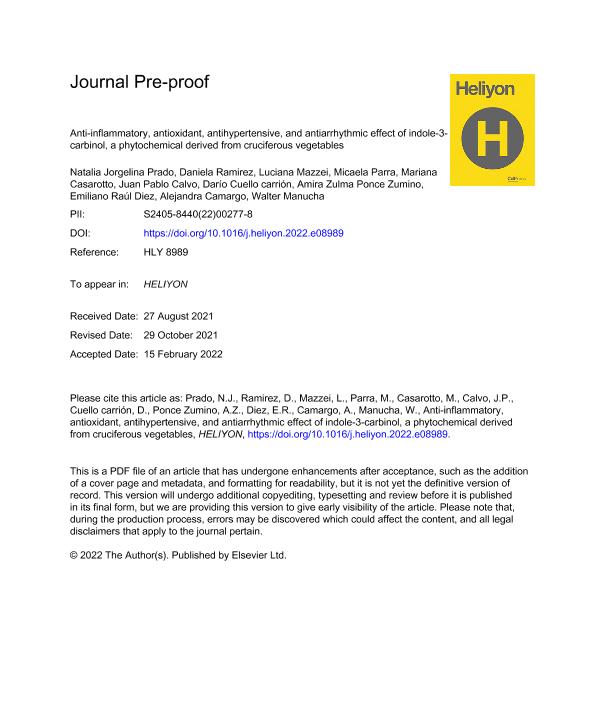Artículo
Anti-inflammatory, antioxidant, antihypertensive, and antiarrhythmic effect of indole-3-carbinol, a phytochemical derived from cruciferous vegetables
Prado, Natalia Jorgelina ; Ramirez, Daniela Andrea
; Ramirez, Daniela Andrea ; Mazzei, Luciana Jorgelina
; Mazzei, Luciana Jorgelina ; Parra, Micaela; Casarotto, Mariana; Calvo, Juan Pablo; Cuello Carrión, Fernando Darío
; Parra, Micaela; Casarotto, Mariana; Calvo, Juan Pablo; Cuello Carrión, Fernando Darío ; Ponce Zumino, Amira Zulma
; Ponce Zumino, Amira Zulma ; Diez, Emiliano Raúl
; Diez, Emiliano Raúl ; Camargo, Alejandra Beatriz
; Camargo, Alejandra Beatriz ; Manucha, Walter Ariel Fernando
; Manucha, Walter Ariel Fernando
 ; Ramirez, Daniela Andrea
; Ramirez, Daniela Andrea ; Mazzei, Luciana Jorgelina
; Mazzei, Luciana Jorgelina ; Parra, Micaela; Casarotto, Mariana; Calvo, Juan Pablo; Cuello Carrión, Fernando Darío
; Parra, Micaela; Casarotto, Mariana; Calvo, Juan Pablo; Cuello Carrión, Fernando Darío ; Ponce Zumino, Amira Zulma
; Ponce Zumino, Amira Zulma ; Diez, Emiliano Raúl
; Diez, Emiliano Raúl ; Camargo, Alejandra Beatriz
; Camargo, Alejandra Beatriz ; Manucha, Walter Ariel Fernando
; Manucha, Walter Ariel Fernando
Fecha de publicación:
02/2022
Editorial:
Elsevier
Revista:
Heliyon
ISSN:
2405-8440
Idioma:
Inglés
Tipo de recurso:
Artículo publicado
Clasificación temática:
Resumen
Background: Cardiovascular inflammation and oxidative stress are determining factors in high blood pressure and arrhythmias. Indole-3-carbinol is a cruciferous-derived phytochemical with potential anti-inflammatory and antioxidant effects. However, its implications on the modulation of cardiovascular inflammatory-oxidative markers are unknown. Objectives: To establish the effects of indole-3-carbinol on the oxidative-inflammatory-proarrhythmic conditions associated with hypertension. Materials: Histological, biochemical, molecular, and functional aspects were evaluated in 1) Culture of mouse BV-2 glial cells subjected to oxidative-inflammatory damage by lipopolysaccharides (100 ng/mL) in the presence or absence of 40 μM indole-3-carbinol (n = 5); 2) Male spontaneously hypertensive rats (SHR) and Wistar Kyoto rats receiving indole-3-carbinol (2000 ppm/day, orally) during the first 8 weeks of life (n = 15); 3) Isolated rat hearts were submitted to 10 min regional ischemia and 10 min reperfusion. Results: 1) lipopolysaccharides induced oxidative stress and increased inflammatory markers; indole-3-carbinol reversed both conditions (interleukin 6, tumor necrosis factor α, the activity of nicotinamide adenine dinucleotide phosphate oxidase, nitric oxide, inducible nitric oxide synthase, heat shock protein 70, all p < 0.01 vs lipopolysaccharides). 2) SHR rats showed histological, structural, and functional changes with increasing systolic blood pressure (154 ± 8 mmHg vs. 122 ± 7 mmHg in Wistar Kyoto rats, p < 0.01); Inflammatory-oxidative markers also increased, and nitric oxide and heat shock protein 70 decreased. Conversely, indole-3-carbinol reduced oxidative-inflammatory markers and systolic blood pressure (133 ± 8 mmHg, p < 0.01 vs. SHR). 3) indole-3-carbinol reduced reperfusion arrhythmias from 8/10 in SHR to 0/10 (p = 0.0007 by Fisher's exact test). Conclusions: Indole-3-carbinol reduces the inflammatory-oxidative-proarrhythmic process of hypertension. The nitric oxide and heat shock protein 70 are relevant mechanisms of indole-3-carbinol protective actions. Further studies with this pleiotropic phytochemical as a promising cardioprotective are guaranteed.
Palabras clave:
ARRHYTHMIAS
,
HSP70
,
HYPERTENSION
,
INDOLE-3-CARBINOL
,
INFLAMMATION
,
OXIDATIVE STRESS
Archivos asociados
Licencia
Identificadores
Colecciones
Articulos(IBAM)
Articulos de INST.DE BIOLOGIA AGRICOLA DE MENDOZA
Articulos de INST.DE BIOLOGIA AGRICOLA DE MENDOZA
Articulos(IMBECU)
Articulos de INST. DE MEDICINA Y BIO. EXP. DE CUYO
Articulos de INST. DE MEDICINA Y BIO. EXP. DE CUYO
Citación
Prado, Natalia Jorgelina; Ramirez, Daniela Andrea; Mazzei, Luciana Jorgelina; Parra, Micaela; Casarotto, Mariana; et al.; Anti-inflammatory, antioxidant, antihypertensive, and antiarrhythmic effect of indole-3-carbinol, a phytochemical derived from cruciferous vegetables; Elsevier; Heliyon; 8; 2; 2-2022; 1-8
Compartir
Altmétricas



